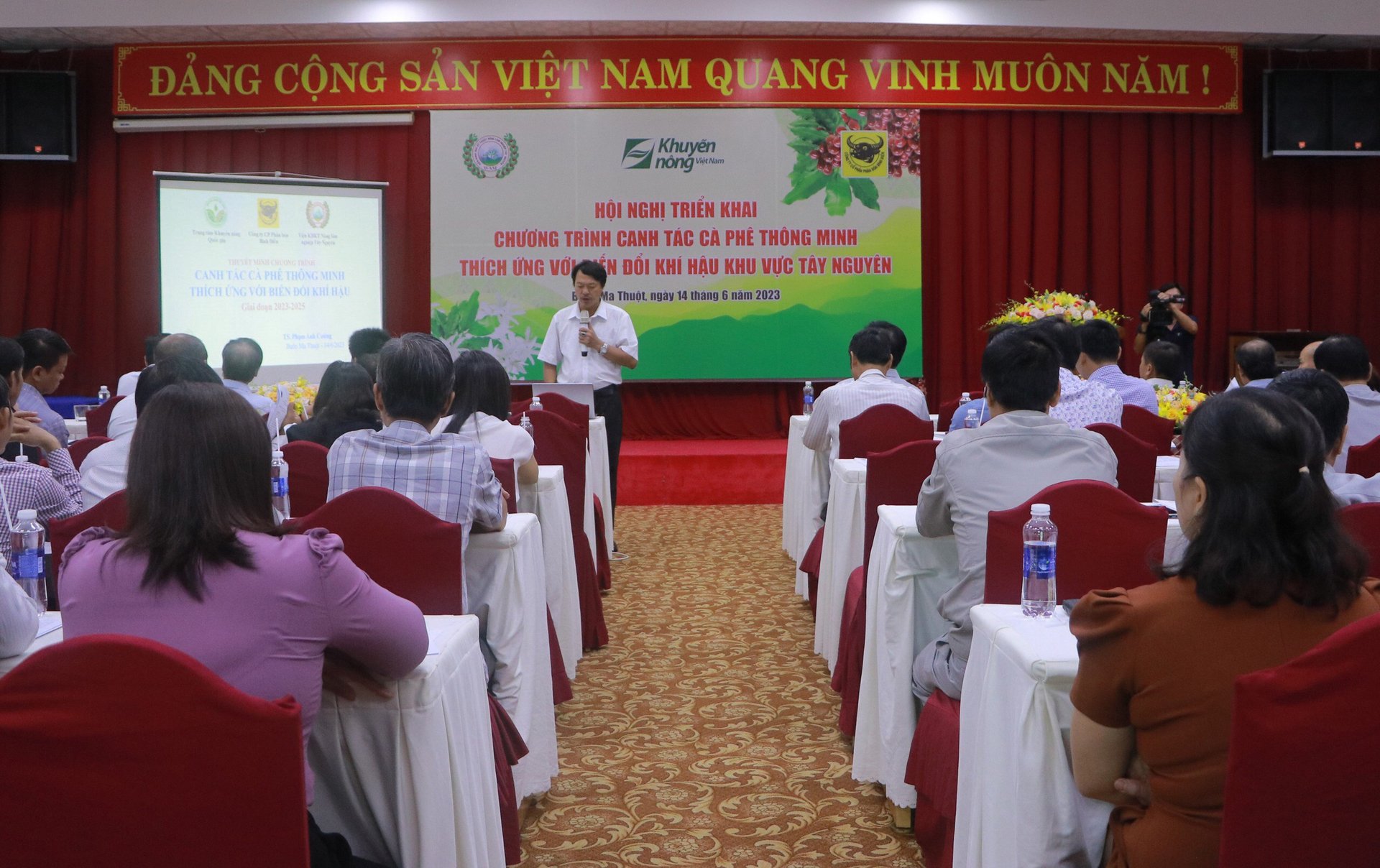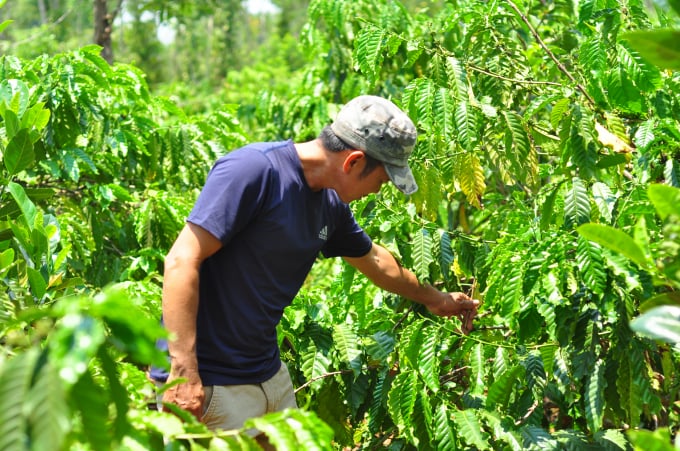June 17, 2025 | 23:19 GMT +7
June 17, 2025 | 23:19 GMT +7
Hotline: 0913.378.918
June 17, 2025 | 23:19 GMT +7
Hotline: 0913.378.918
On June 14, Binh Dien Fertilizer Joint Stock Company, in partnership with the National Agricultural Extension Center and Central Highlands Institute of Agriculture and Forestry Science, organized a conference on the implementation of the "Smart Coffee Cultivation Program to Adapt to Climate Change in the Central Highlands" from 2023 to 2025.
This marks a significant beginning for the program. The program is centered around the introduction and discussion of project implementation site selections, as well as the training of project officials soon.

Delegates participating in the conference to implement the program "Smart coffee farming to adapt to climate change in the Central Highlands" in the period of 2023 - 2025. Photo: Quang Yen.
The new program is launched to identify the limitations and issues present in both pure and intercropped coffee gardens. A new smart coffee farming process is being developed to adapt to climate change, increase economic efficiency, boost income for farmers, and promote green economic development while reducing greenhouse gas emissions.
To attain this objective, it is crucial to prioritize the provision of training for all participants involved. A wide range of experiments will be conducted, varying from small-scale to large-scale, with a particular focus on coffee farming.
Additionally, a survey of over 500 coffee farming households in five Central Highlands provinces will be conducted, alongside an analysis of 200 acres of land used for coffee cultivation in a variety of settings, including pure gardens, intercropping with durian and pepper, old orchards, and prolific business orchards. A new program has been developed to analyze the effects of climate change on coffee cultivation. The program will evaluate the impact on the current process and predict future changes for the next three years. Additionally, the program will assess the impact on coffee soil and its biosystem.

The smart farming program will be an important boost for the coffee production of the Central Highlands to develop sustainably. Photo: Minh Hau.
The Central Highlands has been identified by competent agencies as the primary coffee-producing region in the country, accounting for 92% of the nationwide area dedicated to coffee cultivation. This region plays a significant role in the country's coffee exports and has immense potential for further development. The coffee industry is currently encountering several obstacles. Farming households are engaging in the intensive use of inorganic fertilizers for coffee cultivation, surpassing the recommended limits. Additionally, they have been using unscientific methods for irrigation, resulting in severe soil degradation and an acceleration of soil acidification.
Climate change is having an impact on coffee production in the Central Highlands, in addition to the effects of farming techniques. In 2016, a severe drought had a significant impact on the coffee industry, affecting a total of 116,400 hectares of coffee crops. The province of Dak Lak was hit particularly hard, with a drought area of up to 56,100 hectares. In 2023, the Department of Crop Production reported that 6,900 hectares of coffee crops were lost as a result of drought, based on statistical data.

Mr. Ngo Van Dong, General Director of Binh Dien Fertilizer Joint Stock Company, said that the ultimate goal of the program is to improve people's lives. Photo: Quang Yen.
The Department of Crop Production reports a rapid increase in the area of intercrops within coffee gardens. The fluctuation of coffee prices and the high-income potential of intercrops, such as with durian, are the main reasons for farmers to shift away from coffee-intensive cultivation. Reports indicate that intercropping durian can yield up to 250 million VND, while other intercrops can yield up to 141 million VND. Coffee intercropping with other crops has seen a significant increase in 2021, accounting for 26.17% or 169,900 hectares of the total area. This trend is expected to continue to rise at a rapid pace.
Over six years, from 2014 to 2020, the coffee replanting area has reached an impressive 90,000 hectares. In addition, another 30,000 hectares are slated for grafting and renovation, which accounts for 18.5% of the total coffee area. The replanting plan is set to continue as it has been projected that by 2025, approximately 75,000 hectares will need to be replanted while an additional 32,000 hectares will require transplantation and renovation. Yellow leaf disease root rot and other pests in the soil have led to the replanting and destruction of hundreds of thousands of hectares of coffee crops. This has resulted in shortened business cycles and decreased economic efficiency in many areas.
According to Mr. Ngo Van Dong, the General Director of Binh Dien Fertilizer Joint Stock Company, the primary objective of the program is to enhance the quality of life for individuals.
Mr. Dong has stated that coffee trees are considered long-term crops and therefore require more extensive training than what the company's current program has provided for rice.
The program is expected to improve farming conditions by interfering with the current process. In the coming years, a team of scientists and authorities are set to unveil a new smart farming process that will be implemented for three consecutive years, from 2023 to 2025. According to Mr. Dong, scientists will intervene in technical measures to increase productivity, efficiency, and quality by summarizing each stage, learning from experience, identifying limitations, and existing in implementation.
Translated by Linh Linh
/2025/06/17/3942-2-143243_548.jpg)
(VAN) Recently, in Sweden, the Secretary of the Binh Dinh Provincial Party Committee presented the Investment Registration Certificate for the 'Polyester Fabric Recycling Complex' project to SYRE Impact-AB Company.
/2025/06/12/3721-2-202745_83.jpg)
(VAN) TH made an impression at Seoul Food 2025 with its line of natural beverages, paving the way for Vietnamese food products to enter the South Korean market.

(VAN) Soc Trang's success in rice exports stems from a strategy of developing fragrant and specialty rice cultivation areas and standardizing production toward low-emission practices.
/2025/06/11/1311-5-120811_839.jpg)
(VAN) The pig farming industry is facing the challenge of comprehensive restructuring to meet requirements for quality, safety, traceability, and market expansion both domestically and for export.

(VAN) Vietnam considers participating in ALGROALBA in order to expand agricultural production, coordinate the assessment and effective exploitation potential land.
/2025/06/05/5314-1-184727_407.jpg)
(VAN) From seemingly worthless fish scales and skin, enzymes and lactic ferments can transform by-products into peptides, opening a sustainable, effective business direction and elevating Vietnamese seafood.

(VAN) TTC AgriS and IFC signed a strategic partnership to develop a sustainable agricultural value chain, aiming to achieve the Net Zero target by 2035.